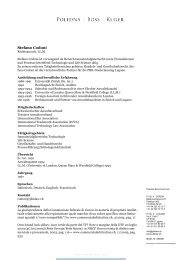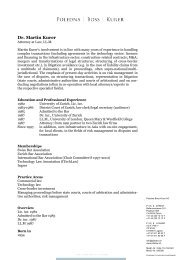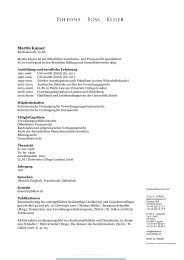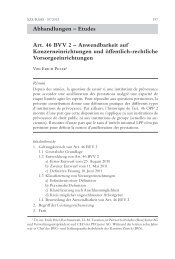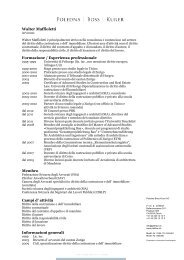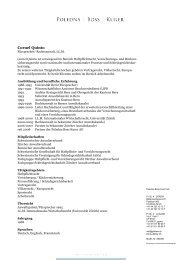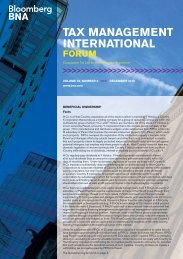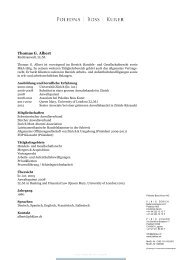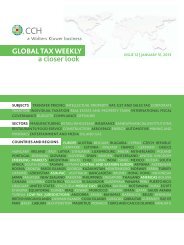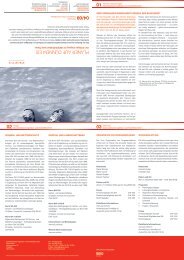the 2003 European Union Savings Directive, theautomatic exchange of information within the EuropeanUnion.Concluding, the Government emphasized thatLuxembourg "wishes to see the same conditionsapply to all competing financial centers and to seethe automatic exchange of information accepted asthe international standard." To this end it thereforeagreed on May 14, 2013, to grant the EuropeanCommission a mandate to negotiate with Switzerland,Liechtenstein, Andorra, Monaco and SanMarino, the Government pointed out.GermanyGermany signed its Model 1A (reciprocal) IGAwith the Treasury on May 31. There is also a contemporaneousMOA which clarifies some aspectsof the IGA.A declaration of understanding , also signed May 31,clarifies several provisions in the Germany-U.S. IGA .SwitzerlandThe Swiss Committee for Economic Affairs andTaxes of the Council of States (CEAT-S) has givenits seal of approval to the FATCA Model 2 agreement(IGA) concluded with the US.The Intergovernmental Agreement was concludedon February 14, 2013. On April 10, the Swiss FederalCouncil approved the IGA, and forwarded theagreement to parliament for its approval.The CEAT Committee examined the FATCA accordfollowing in-depth consultation with a numberof key stakeholders, including the Swiss-USChamber of Commerce, the Swiss Bankers Association,the Swiss Insurance Association, and the FederalCommissioner responsible for data protection.Having carefully debated the problem that Switzerlandhas limited scope to maneuver on the issue,the Committee assessed the concrete implicationsof rejecting the FATCA deal, on both the Swisseconomy and on the Swiss financial center. It alsoexamined the agreement within the context of effortsto find a solution to resolve the past.Th e Committee finally approved the decree establishingthe accord and the federal law implementingthe treaty, by six votes to three with twoabstentions and by six votes to two with three abstentionsrespectively. A minority put forward theidea of returning the case to the Federal Counciland tasking the Federal Council with negotiatinga model one accord, providing for an automaticexchange of information.Commenting on its decision to endorse the agreementat the time, the Swiss Government said thatwhile the United States' extraterritorial legislationhad not been well received, it was nevertheless acknowledgedthat it was favorable to sign an IntergovernmentalAgreement with the United States tosimplify compliance with the new regime for Swissfinancial institutions.16
Th e Government pointed out in particular thatthe US-Swiss agreement ensures that accountsheld by US persons with Swiss financial institutionsare disclosed to the US tax authorities eitherwith the consent of the account holder or throughnormal administrative assistance channels. Consequently,information will not be transferred automaticallyin the absence of consent, and insteadwill be exchanged only on the basis of the administrativeassistance clause in the two countries'double taxation agreement.As the United States will phase in FATCA fromJanuary 1, 2014, Swiss financial institutions will beforced to implement FATCA from this date, irrespectiveof an agreement between Switzerland andthe United States, if they do not want to be excludedfrom the US capital market. The agreed simplificationswill not apply if there is no agreement, theGovernment clarified.Th e Swiss Private Bankers Association (SPBA)has highlighted its objections to certain aspectsof the Swiss Federal Council's bill implementingthe revised Foreign Account Tax Compliance Act(FATCA) recommendations, notably the definitionof a punishable tax crime as a predicate tomoney laundering.While supporting in principle a policy of tax conformity,as well as plans to implement FATCA, theinternational standard in the fight against moneylaundering, the SPBA nevertheless warns that Switzerlandmust not profit from this legislative revisionto introduce, "by the back door," internal legislativereforms that are simply not required under theUS FATCA legislation.The SPBA opposes plans to extend the concept oftax fraud. Currently, this infraction arises from theuse of false or falsified documentation. The FederalCouncil intends to unnecessarily extend thedefinition to include cases of "artful deception,"the SPBA notes. Given that this concept is "veryvague," applying the measure will pose unsolvablepractical problems for the banks, the association argues,making clear that banks simply do not havethe means with which to detect such indications, inparticular in the case of foreign clients.Furthermore, for Swiss clients, introducing theconcept of "artful deception," which could leadto a prison sentence of three years or more, would"profoundly modify relations between the citizenand the state," the SPBA stresses.Finally, the Federal Council also aims to introducethe term "qualified tax fraud," the SPBA explains,pointing out that this offence constitutes a crime,punishable with a prison sentence of five years, aswell constituting a predicate offence to money laundering.The SPBA laments the fact that the onlyqualifying element currently proposed by the FederalCouncil is the presence of undeclared taxableassets in excess of CHF600,000 (USD624,035).According to the SPBA, it is simply not "appropriate"to base the crime of qualified tax fraud merelyon the taxable base, in view of the fact that this is17
- Page 1 and 2: GLOBAL TAX WEEKLYa closer lookISSUE
- Page 3 and 4: GLOBAL TAX WEEKLYa closer lookISSUE
- Page 5 and 6: FEATURED ARTICLESISSUE 30 | JUNE 6,
- Page 7 and 8: taxation treaties concluded by Swit
- Page 9 and 10: FEATURED ARTICLESISSUE 30 | JUNE 6,
- Page 11 and 12: FEATURED ARTICLESISSUE 30 | JUNE 6,
- Page 13 and 14: UK, its offshore dependencies, and
- Page 15: financing and all forms of financia
- Page 19 and 20: Talks are now underway. The TIEA wi
- Page 21 and 22: through which they can clamber in o
- Page 23 and 24: fi nally, and most egregiously, the
- Page 25 and 26: office space, or own tangible asset
- Page 27 and 28: extended for 2 years in December 20
- Page 29 and 30: Financial transactions ( e.g. inter
- Page 31 and 32: OECD Section E - Redraft On Safe Ha
- Page 33 and 34: suggests that the following items m
- Page 35 and 36: FEATURED ARTICLESISSUE 30 | JUNE 6,
- Page 37 and 38: State Interest And IntangibleExpens
- Page 39 and 40: States generally define "intangible
- Page 41 and 42: Code Sec. 1563(controlledgroup)Stat
- Page 43 and 44: ConnecticutGeorgiaIllinoisIndianaRe
- Page 45 and 46: Rhode IslandTennesseeVirginiaWest V
- Page 47 and 48: Table 4. Comprehensive Income Tax T
- Page 49 and 50: include federal interest income, st
- Page 51 and 52: Recurring IssuesRestructuring of th
- Page 53 and 54: M&A. Nick has extensive experience
- Page 55 and 56: and consumers." As Germany and Chin
- Page 57 and 58: on many levels. The panel found tha
- Page 59 and 60: equirements placed on the states, i
- Page 61 and 62: NEWS ROUND-UP: COUNTRY FOCUS - ITAL
- Page 63 and 64: NEWS ROUND-UP: REAL ESTATE AND PROP
- Page 65 and 66: ates - such that, in 2014, the 4 pe
- Page 67 and 68:
NEWS ROUND-UP: FTTISSUE 30 | JUNE 6
- Page 69 and 70:
NEWS ROUND-UP: ENVIRONMENTAL TAXESI
- Page 71 and 72:
Finally, the Federal Council veheme
- Page 73 and 74:
Singapore Plugs Benefits For SMEsOf
- Page 75 and 76:
TAX TREATY ROUND-UPISSUE 30 | JUNE
- Page 77 and 78:
CONFERENCE CALENDARISSUE 30 | JUNE
- Page 79 and 80:
Key speakers: John Capasso (Alvarez
- Page 81 and 82:
Key speakers: TBA6/27/2013 - 6/27/2
- Page 83 and 84:
6/14/2013 - 6/14/2013http://www.con
- Page 85 and 86:
THE CYPRUS BAIL-OUT ANDFOREIGN CLIE
- Page 87 and 88:
Chair: Jonathan Levy (Partner, Reyn
- Page 89 and 90:
IN THE COURTSISSUE 30 | JUNE 6, 201
- Page 91 and 92:
on including the profit from the do
- Page 93 and 94:
deduct VAT as a result of incomplet
- Page 95 and 96:
where the taxpayer had somehow offs
- Page 97 and 98:
een paid in the destination State.
- Page 99 and 100:
that Spain has gone its own way fir



